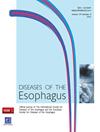476. PATIENTS WITH TRACHEOSTOMY HAVE HIGHER INCIDENCE OF ESOPHAGEAL REFLUX AND DON’T PRESENT TYPICAL SYMPTOMS
IF 2.3
3区 医学
Q3 GASTROENTEROLOGY & HEPATOLOGY
引用次数: 0
Abstract
Lung diseases have a strong relationship with gastroesophageal reflux disease (GERD). It has been previously demonstrated that conditions such as tracheal stenosis, asthma and even lung transplantation may worsen with reflux and these patients have few symptoms of GERD. With the COVID-19 pandemic, the number of people who needed mechanical ventilation and tracheostomy increased. Our objective was to demonstrate the prevalence of gastro-oesophageal reflux (GER) in patients with tracheostomy and describe its characteristics. Esophageal manometry and 24 h pH-metry was performed in 137 consecutive patients with a tracheostomy already in a chronic phase, independent of symptoms. Inquire on respiratory and digestive symptoms was also carried out at the time of the examination. Prevalence of gastroesophageal reflux was identified in this population and description of the groups with reflux and without it, as well as comparison between them. Of the 137 patients, 49 were male, the average age was 40.94 ± 17.3 and the BMI was 26.3 ± 4.85. The prevalence of GER was 45.2%. Characteristics were similar between the groups with and without reflux. In the reflux group, the mean DeMeester score was 36.5 ± 20.8 and the presence of lower sphincter hypotonia was found in 31% of the patients and was not correlated with reflux (p = 0.285). 48% had heartburn symptoms and only 30% had a combination of heartburn and regurgitation. There was no association with higher DeMeester score and presence of symptons (p = 0,14). The presence of tracheostomy is related to an increased prevalence of reflux, even without typical symptoms most of the time. The mechanism for this is still unknown, perhaps the altered respiratory dynamics has a role. These patients should be investigated with functional exams if they develop any condition that may be affected by reflux.476. 气管切开术患者食管反流发生率较高,且无典型症状
肺部疾病与胃食管反流病(GERD)有密切关系。先前有研究表明,气管狭窄、哮喘甚至肺移植等疾病可能会因反流而恶化,而这些患者几乎没有反流的症状。随着COVID-19大流行,需要机械通气和气管切开术的人数增加。我们的目的是证明胃食管反流(GER)在气管切开术患者中的患病率,并描述其特征。食道压力测量和24小时ph测量在137例连续的气管切开术患者已经处于慢性期,独立于症状。检查时还询问了呼吸道和消化系统症状。在该人群中确定了胃食管反流的患病率,并描述了有反流和无反流的组,以及它们之间的比较。137例患者中,男性49例,平均年龄40.94±17.3,BMI 26.3±4.85。GER患病率为45.2%。有反流和无反流组之间的特征相似。反流组平均DeMeester评分为36.5±20.8,31%的患者存在下括约肌张力低下,与反流无关(p = 0.285)。48%的人有烧心症状,只有30%的人同时有烧心和反流。与较高的DeMeester评分和出现症状没有关联(p = 0,14)。气管切开术与反流发生率增加有关,即使大多数时候没有典型症状。其机制尚不清楚,也许是呼吸动力学的改变起了作用。如果这些患者出现任何可能受反流影响的情况,应进行功能检查。
本文章由计算机程序翻译,如有差异,请以英文原文为准。
求助全文
约1分钟内获得全文
求助全文
来源期刊

Diseases of the Esophagus
医学-胃肠肝病学
CiteScore
5.30
自引率
7.70%
发文量
568
审稿时长
6 months
期刊介绍:
Diseases of the Esophagus covers all aspects of the esophagus - etiology, investigation and diagnosis, and both medical and surgical treatment.
 求助内容:
求助内容: 应助结果提醒方式:
应助结果提醒方式:


